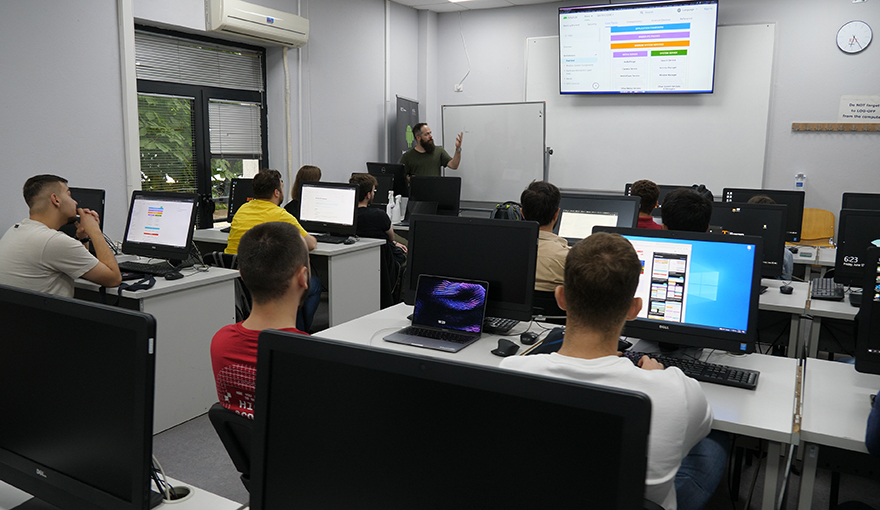2014 KGGTF grant, Innovative and Green Growth for Rural Areas: Investing & Scoping, continues to pay dividends nearly a decade later.
The US$ 485,000 grant provided technical assistance and advice to help Kosovo design a rural broadband program to give access to everyone in selected underserved areas.
Now nine years later, Kosovo's Ministry of Economy’s recent success in connecting its final village to high-speed broadband internet, with support from the IDA-financed US$ 25 million Kosovo Digital Economy Project (KODE), can trace its origins to that KGGTF grant.
The blog below outlines Kosovo's recent achievement and was co-authored by one of the implementing team members of the 2014 KGGTF grant.
"Connecting the Unconnected: A Digital Revolution in Rural Kosovo"
By: Nicole Klingen, Massimiliano Paolucci, Natalija Gelvanovska-Garcia
The following story was originally published on June 15, 2023, in 'Up Front'

At first glance, the village of Herticë in northern Kosovo may seem insignificant in light of the country's digital transformation. But in March 2023, this picturesque community of 900 became the last village in Kosovo to be connected to the country's high-speed broadband internet. Kosovo now has one of the highest numbers of high-speed internet subscriptions per household in ECA, outpacing even leading European countries.
Transforming Kosovo's Digital Economy
Kosovo's Ministry of Economy reached this milestone with support from the IDA-financed Kosovo Digital Economy Project (KODE). The project, which closes next year, expanded access to high-speed, better-quality digital infrastructure, connecting Kosovars domestically, regionally, and globally. This initiative gives Kosovars more opportunities to generate income, access digital services, and expand learning possibilities.
Key elements of KODE's approach included expanding broadband connectivity into previously unserved areas, promoting digital literacy and skills, and improving the digital enabling environment through institutional, legal, and regulatory reforms. This ambitious initiative, which encompasses everything from infrastructure development to education and policymaking, is expected to revolutionize the digital landscape of Kosovo.
The project also financed the National Spectrum Monitoring System to manage Kosovo's broadband spectrum resources more efficiently and boost its digital economy. It established the Kosovo Research and Education Network (KREN) and connected Kosovo to the pan-European network of universities (GÉANT), which will significantly enhance research and teaching capabilities. Furthermore, the integration of Kosovo's universities into KREN has led to innovative, reliable, and cost-effective service delivery, improving the quality of education.
In addition, the ongoing Youth Online and Upward (YOU) Program has already trained 400 young people in seven regions of Kosovo and will ultimately train 2,000 youth in advanced digital skills.
PHOTO: In 2018, around 200 students at the Anton Çetta school in Gjakova, Kosovo were connected to the internet through KODE efforts.
Enhancing Connectivity and Opportunities
As a result, 60,000 people living in more than 200 villages are linked to the global economy through high-speed broadband internet. In addition, 107 schools and 43 healthcare institutions are connected. Digital access is creating new opportunities for rural Kosovars in business, education, healthcare, and communication.
The increased educational opportunities the project provided for children and young people in Kosovo are especially vital. They can now tap into a wealth of educational resources previously inaccessible to them, expanding their horizons and providing new educational opportunities beyond traditional boundaries.
Herticë is already seeing real results on the ground. "Since this network was installed, there have been many benefits, for example, for students with schooling and education, and in the clinic for consultations," said Florim Muqolli, a village representative. "So, everything is much better."
Engaging the Private Sector
The private sector has played a pivotal role in this journey, with companies like ARD Holding deploying fiber optic technology throughout Kosovo. Nuridin Hasani, CEO of ARD Holding, highlighted how the project has improved internet connectivity and resulted in economic growth and more customers, especially in rural areas. "We have employed over 50 people and continue to deploy fiber optics technology throughout Kosovo," he said.
The private sector's collaboration with public entities has been instrumental in reaching the milestone of full broadband penetration. Natalija Gelvanovska Garcia of the World Bank lauded this collaboration, acknowledging the project's execution and impact on Kosovo's digital economy. The private sector's involvement both facilitated the implementation of this project and paved the way for sustainable digital advancement, positioning Kosovo competitively on the global stage. The role of private companies in this project serves as a model for other nations striving to achieve similar digital milestones.
 PHOTO: The World Bank’s Nicole Klingen and Natalija Gelvanovska-Garcia take a selfie during a ceremony in the remote village of Hertice—the last village in Kosovo to be connected to highspeed broadband internet.
PHOTO: The World Bank’s Nicole Klingen and Natalija Gelvanovska-Garcia take a selfie during a ceremony in the remote village of Hertice—the last village in Kosovo to be connected to highspeed broadband internet.
Embracing a Connected Future
The transformative power of the KODE project demonstrates the incredible potential of a digitally connected world. Through the synergies of the partnership between the government of Kosovo, the Bank, and the private sector, Kosovo has achieved an unparalleled feat—connecting the country's most remote corners to the globe-girdling digital highway. This accomplishment represents a bold step towards a future where geography no longer dictates access to opportunities. From the humble village of Herticë to larger urban areas, the digital revolution is now a tangible reality for every Kosovar.
The ripple effects of this project will be seen in sectors ranging from education to healthcare, reshaping the socio-economic landscape of Kosovo. The KODE project, in its essence, serves as a model for other countries, highlighting the transformative potential of digital economies when public intent, private enterprise, and international cooperation converge.
